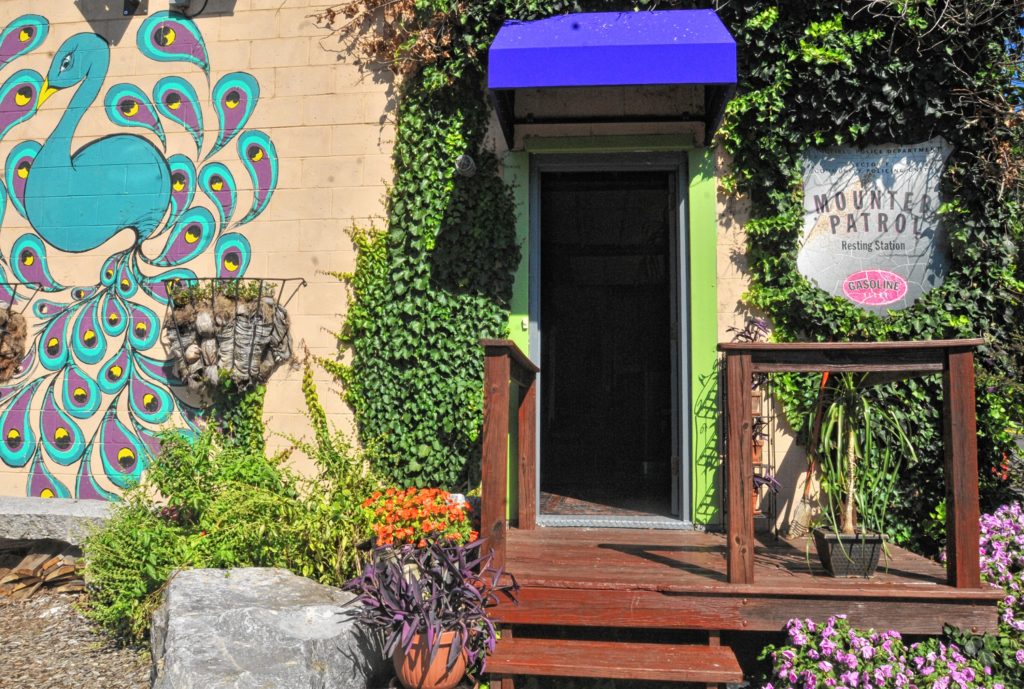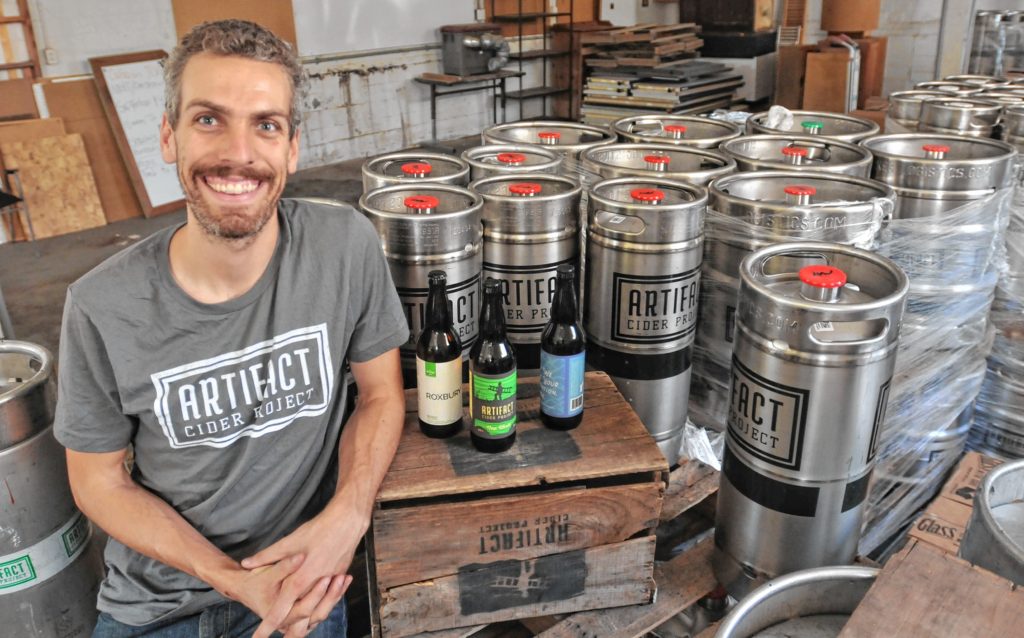On an unseasonably warm day in late September, Joe Sibilia is roaming the Gasoline Alley mill building complex on Albany Street in Springfield. The 59-year-old is wearing a pair of loose fitting yoga pants and his body and shaved bald head have been tanned to a deep umber from a long summer working in the sun.
Sibilia walks briskly around the building toward the back of the facility. He’s met with good-natured jokes and laughter from three teenagers who have been sweeping out a derelict building, preparing to repaint it. The youths are all part of a New England Farm Workers Council prep program aimed at helping them get their GEDs. Sibilia’s nonprofit Gasoline Alley Foundation has partnered with them to offer a mentorship program of its own which gives them jobs and is aimed at teaching them marketable skills and principles of entrepreneurship. Sibilia and the youths just call it “Hugs for Thugs.”
“I love these kids,” Sibilia says. “Nobody’s giving them a chance.”
Given the teens’ track records — some have had trouble with the law and at home — he says, employers are unlikely to be fighting over them.
Marion Crosby is one of the program participants. He’s 17 and he says he’s made some “bad choices” in his life, but his experience in the program has allowed him to reconsider his future — something he’d once discounted.
“Growing up as an African American male without a father is tough,” he says. “I had to grow up and learn everything on my own. I learned from the streets and stuff. I try not to let that make me, basically. I chose to make my own path in life and I chose to be successful. That’s why I’m here today and not in the streets.”
Crosby, who dropped out of school for reasons he declined to talk about, now has his sights set on becoming an engineer.
“A lot of people tell me to just think big,” he says. “Try to go for engineering planes. At first I was just thinking that I could just go for fixing cars, but a lot of people basically inspired me to do more; told me I’m able to anything in life. Like for college, I’m looking to go to Greenfield College, so that’s something I’ve got to look forward to.”
People like Crosby are a major reason why Sibilia said he started the Gasoline Alley Foundation over 30 years ago: he was intent not just on helping people, he says, but giving them the tools to help themselves.
“I’m a social worker disguised as a businessman,” Sibilia says.
Gasoline Alley became a business incubator/accelerator before it was cool. So far, the foundation has worked with more than 65 business start-ups, including Artifact Cider, EcoBuilding Bargains (formerly the ReStore), OxiClean, and Al’s Coffee Company, all of which have incorporated a commitment to sustainability and ethical practices into their business models. The business environment has changed a lot since the outset, and while Sibilia’s brand of social entrepreneurship has become more popular, it’s still not common.
“I think it’s important to recognize what a pioneer Joe and Gasoline Alley was,” says John Majercak, a founding member of EcoBuilding Bargains. “This whole social entrepreneurism and triple-bottomline stuff — I’m not going to say it’s mainstream, but it is way more commonplace and understood — especially in places like the Pioneer Valley. [Sibilia is] one of the guys that really helped make this become more of a regular thing that people talk about on a national level. I think Joe deserves a lot of credit for being one of the pioneers there.”
The money to keep Gasoline Alley open largely comes from one source: Sibilia’s successful venture capital firm, MeadowBrook Lane. Sibilia says the firm has sold 19 of its own businesses, including the Bank of Western Mass and a beverage company that was ultimately sold to PepsiCo.
As for continued funding support for the nonprofit, Sibilia is committed.
“We haven’t really formalized all the stuff that we do,” he says. “It’s just not well-managed in terms of the mechanics of it. We do the work. Somehow it seems to get done.”
Gasoline Alley feels kind of like a kooky adult tree house. In addition to burgeoning businesses, the place also hosts a motorcycle club, an event and meeting space with an enviable man cave, and is covered floor to ceiling in plants and art. There’s a lot going on, but that’s Sibilia in nutshell. It’s an oasis of sorts in the midst of a stark, sprawling industrial strip of giant fuel oil storage tanks, heaps of jagged scrap metal, and tarnished red brick facades with gaping garage doors. It’s newly renovated and the buildings are a spotless lime green with orange accents, making it pop from the dingy asphalt landscape. A crushed red sports car stands upright in the midst of a planter garden, a quirky homage to Albany Street’s automotive past.
The foundation has “graduated” over 65 socially responsible businesses from its business accelerator/incubator program during its lifetime. The vast majority were short-lived, Sibilia acknowledges, but only about a third of all new businesses make it past the 10-year mark, according to the Bureau of Labor Statistics. Sibilia is quick to point that out, and that a number of those entrepreneurs have gone on to start more successful businesses.
It’s about giving people the tools, he says, and there’s more than one way to define success. But the business has to be the right business to fully take advantage of what Sibilia has to offer.
Knowing which businesses to incubate and who to mentor is not always apparent. Gasoline Alley has a board of directors, but Sibilia says they can’t always get together to talk through which businesses get picked, and the process isn’t well defined.
“I wish we were that organized,” Sibilia says. “We kind of choose them for what we think the community would need at the certain time.”
It seems like the choice of businesses and mentees is largely left up to Sibilia himself and his longtime business partner, Gasoline Alley’s treasurer Jack Wysocki, whom Sibilia says has been instrumental since day one.
Today there are just a handful businesses operating there, including Artifact Cider and Gasoline Alley The Salon. According to Sibilia and Jake Mazar, co-owner of Artifact Cider, the amount of rent paid is determined by the amount of space a business requires, as well as what they can afford. Businesses generally stay anywhere from a year to ten or more, depending on their needs.
Mazar and Soham Bhatt, co-owners of Artifact Cider, say they chose Gasoline Alley because of the scrappy feel that the incubator had, as well as their shared values.
“For Joe, his mission is to revitalize that part of Springfield,” Mazar says. “One of things that he said to me on the first day we met was that the goal of the Gasoline Alley Foundation is ‘to find value in that which has been abandoned.’ That really resonated with Soham and me.”
The biggest benefit to operating out of Gasoline Alley may be the guidance and education Sibilia and peer business owners provide, but support can come in many forms.
“He helped us in everything from reviewing our first business plan to literally driving the forklift the day that we got our first delivery of juice from a local orchard,” Mazar says. “What we’ve done so far would not have been possible without the support of Joe and everyone at Gasoline Alley.”
Michelle Scibelli is the owner of Gasoline Alley The Salon, which she bought when the previous owner retired in 2003. She started as a stylist there in 1998 after working in a salon in the Longmeadow area. She said that she had her doubts about operating a salon in a sparse industrial area in Springfield, but once she visited, she was won over.
“The whole vibe was great. It was nontraditional, the people inside were nontraditional, it was sort of countercultural to what was happening in a plaza up in Longmeadow,” Scibelli says. “There’s always people around that are trying to do interesting things. I think that’s what attracts them to Joe and what attracts Joe to them. He always wants to get something going that other people don’t see the value in. … There’s always creative, innovative folks hanging around.”
Without Sibilia, she says, she would not have been able to run her business as successfully as she has. When she first started, she says, didn’t even know what a balance sheet looked like.
“I just went to hairdressing school, so I had no business background,” Scibelli says. “And having [Sibilia] around just felt really safe. … Safe in knowing that there was someone 100 yards away that could help me in a situation that was new or foreign to me.”
Even after 30 years, Sibilia and Gasoline Alley are still dedicated to implementing their big ideas. Big plans are in the works for the building that the youth program participants were cleaning up. The Gasoline Alley Foundation has partnered with Tony Renzulli, a grower/manager at Farmtek, an agricultural systems company out of South Windsor, Connecticut, to turn the space into what he calls an indoor hydroponic “urban micro-farm” capable of producing 1,500 heads of lettuce per week within the next 18 months. Eventually, he says, the idea is to address the problem of food deserts in Springfield.
“I’m looking at being the anti-Starbucks,” he says. “Instead of being on every corner for the wealthy people to get their five-dollar coffees, we’d be in depressed areas being able to feed people good quality food at a fair price and lift their standard of living.”
Sibilia is excited to bring the urban micro-farm to Gasoline Alley — affordable, healthy foods for everyone is a passion of his.
“Making money and accumulating wealth is easy,” Sibilia says. “What’s hard is accumulating wealth that benefits a lot of people. It’s very easy to concentrate on making money for yourself at a disadvantage to everyone else. And that’s really the way the system works. I have to win and you have to lose in order for this thing to be right. I’m not buying that.”
Contact Peter Vancini at pvancini@valleyadvocate.com.










